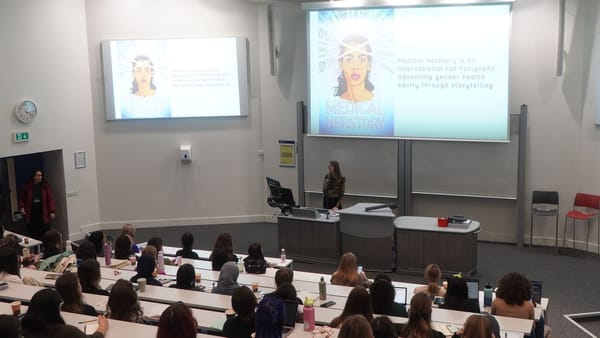Gate crashing the Oxford Climate Forum
Caroline Wood escapes London for a sustainable future
Very early on Saturday morning, whilst Freshers were making their way home from Fabric, I was venturing across London for an entirely different reason. I was battling my way through the bitterly cold morning air so that I could catch a train from London Paddington to Oxford in order to attend the annual Oxford Climate Forum. The Oxford Climate Forum is the country’s highest-profile conference on climate change organised entirely by students bringing leading thinkers and doers under one roof to discuss the key environmental concerns facing the global community. As a sustainability enthusiast, not even the malfunctioning heating systems on Great Western trains could deter my excitement about this event. It was 7am on a Saturday morning, I was sat on a (literally) freezing cold train and I was raring to go!
Unfortunately, things weren’t entirely that idyllic. I’d managed to persuade a friend from UCL to come with me, and whilst I was feeling gleeful and inspired as we trundled past frost-covered fields glittering in the morning sun, she was feeling tired, cold and in desperate need of caffeine. I sure hoped that this event would be worth the journey.
The first talk of the morning was from lawyer Polly Higgins, who pledged that we need to govern the planet’s right to life as we do for humans. In order to do this she believes that Ecocide is the missing 5th Crime Against Peace and that it should sit alongside genocide as an international crime throughout the world. She made a convincing argument and managed to express what can sometimes sound like hippy-speak in an authoritative manner. However, I was not blown away. Imposing laws and trying to change social attitudes is not, in my view, the best pathway to a sustainable future.
How can we equitably share the burden of climate change?
Other morning sessions threw up difficult questions such as “do developing nations have a right to rapid development or a responsibility to develop sustainably?” and “how can we equitably share the burden of climate change?” The issues raised were tackled with vigour, intellect, and enthusiasm, with speakers from a broad range of backgrounds, including academia, business, and charity offering a far-reaching and deep range of expertise. Even seemingly impenetrable questions such as “how can you ask people in poverty to care about climate change?” were discussed with a refreshingly realistic stance. Yet despite the stimulating topics, heartfelt talks and optimistic vibe, I was still not feeling particularly inspired.
Over lunch, a friend from Oxford walked us round the beautiful grounds of Worcester College (a depressing reminder of how ugly the Sherfield building really is) and we all agreed that we were impressed, but not blown away. We came to the conclusion that the reason we weren’t high on inspiration was because all the talks had been focusing on the problems, but none of them provided any solutions.
Luckily, the afternoon sessions served up plenty of what we wanted. “The Greenest Government Ever?” session kicked off the afternoon. Tom Burke, founding director of the think tank E3G, former Executive Director of Friends of the Earth and visiting professor here at Imperial College London (and UCL) was one of the more enigmatic panellists from this session. On energy politics of the future, he urged us to take collective action, to get involved in politics, and boldly summed up the session by saying “If you’re under 40, you’d better start doing something!”
Mark Lynas kept mid-afternoon sleepiness at bay by conducting a fun and interactive session called “Future visions”. Using the DECC 2050 energy pathways calculator, he managed to get an audience of 200 to predict the UK’s energy supply and demand in 2050. The good news is that, with current technology, we can make it to a zero carbon economy by 2050 (just)! The bad news is that using our demand predictions, we need to be wildly ambitious about the number of offshore wind-farms, solar panelled roofs and biomass power stations we can install in under 40 years...
If you’re under 40, you’d better start doing something!
But unsurprisingly, like any true Imperialite, my absolute favourite session of the day was called “Can Technology Beat Climate Change?” Dr. Ralph Clague of Gordon Murray Design Limited, a world leader in automotive design, showed us how the vision of electric powered cars could become a reality. He showed us prototype low carbon city cars (which are thankfully much prettier than the G-wizz) and talked us through their new efficient production process called iStream (commendably admitting that it was indeed named iStream as “anything sounds cool if you put an ‘i’ in front of it”). In my view, the most visionary, most ambitious and most exciting solution was called DESTERTEC. DESERTEC’s vision is to harness solar energy from deserts, and transport the energy generated via international grids. Yes, that’s deserts (meaning Africa and the Middle East) and international grids (meaning political negotiations). I told you it was ambitious. However, given the fact that in just 6 hours deserts receive more energy from the sun than human-kind consumes in a year, it seems the idea is worth pursuing in spite of political and funding issues.
Jeremy Leggett, described by the Observer as “Britain’s most respected green energy boss”, a social entrepreneur, and author of The Carbon War and Half Gone gave a compelling closing speech. Pragmatic and persuasive, Jeremy left us with some motivating closing thoughts: we can use existing technologies to get where we want to be. If we mix and match existing technologies, we can domestically provide enough energy for the UK. But people are scared to listen to warnings about peak oil. There is a deeply rooted defence of the status quo, and we need seismic change that can make green ideas go viral and go global.
So there you have it. A great day came to an end. 200 people ventured out of Oxford’s town hall, into the freshly fallen snow, feeling motivated and inspired to keep working towards a sustainable future – my sceptical friend from UCL included.







